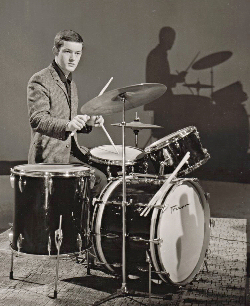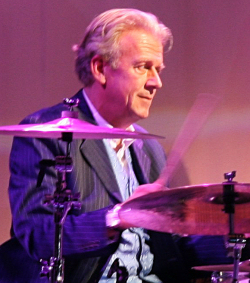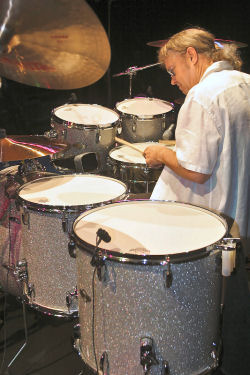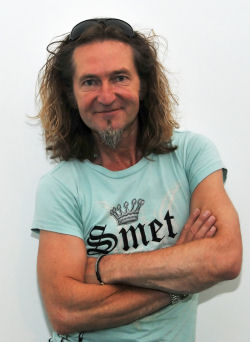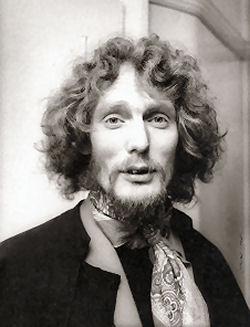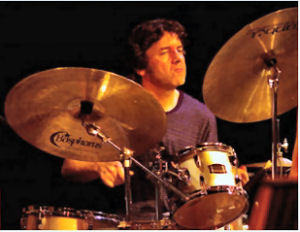 Paul Robinson and I were supposed to get together at Drummer Live but in the event, the racket there wasn’t conducive to recording an interview and he came around to my place for a couple of gallons of coffee and a good chat. By the time the coffee kicked in we were both losing our inhibitions and the article doesn’t contain some of the racier stuff we talked about that morning – stuff that happened when we were young and impressionable before marriage, children and mortgages. But what it does show is that in the 21st century there are new ways to earn a living as a drummer – in Paul’s case without leaving home. Firstly though we touched on our influences and we discovered a lot in common from the early days of touring America playing with various unlikely artists.
Paul Robinson and I were supposed to get together at Drummer Live but in the event, the racket there wasn’t conducive to recording an interview and he came around to my place for a couple of gallons of coffee and a good chat. By the time the coffee kicked in we were both losing our inhibitions and the article doesn’t contain some of the racier stuff we talked about that morning – stuff that happened when we were young and impressionable before marriage, children and mortgages. But what it does show is that in the 21st century there are new ways to earn a living as a drummer – in Paul’s case without leaving home. Firstly though we touched on our influences and we discovered a lot in common from the early days of touring America playing with various unlikely artists.
In my Argent days we never knew who we were going to support or who was there to support us. We’d find Don Ellis at the gig or you find you were supporting Zappa or Return to Forever, or Mahavishnu, and nobody ever thought ‘Hang on, we’re a rock n roll band why are we here?’ We didn’t care, and had a wonderful time, which will never happen again.
It’s a shame. We were supporting Kenny Loggins with Sniff ‘N’ The Tears for the first 6 weeks [in the U.S.A.], then we supported Kansas. In the horn section with Kenny Loggins was a guy called Vince Denham, and we used to talk quite a lot, coming from the jazz world as we both did, and I said how much I liked Don Ellis and Ralph Humphrey. I asked if he played on this certain album and he said that yes, he had done. One of the tracks from that album was the theme from The French Connection, and it was a Don Ellis tune. It was in 7/4 and it was the whole band sound and the tough tenor sound I thought was so great, and he said he would give me Ralph’s number. So when I got to LA, I rang Ralph up and asked if he was doing any gigs that I could come to. He wasn”t, because he was probably doing all the studio work at the time, but it was nice to connect with him.
Did you tour with country singers? I used to love it.
And why not? I love country vocals actually. They tell a story, and it’s the least complicated genre of music you’re ever going to find. If you get it wrong it’s because you don’t understand the genre, it’s definitely what you leave out in country music.
But what I like is, you get the English pop awards and you’ll probably find a lot of backing tracks or the vocals are a bit dubious, whereas on the Country Music Awards, all the vocals always sound great live, and the backing vocals are lovely, that’s what I like about country music, the voices.
So let’s rewind a bit, who are your influences?
Not much has changed from when I was about 13 really. Max Roach was an early influence, Buddy Rich of course. Ralph Humphrey was a drummer I discovered through Don Ellis and Frank Zappa, John Guerin was another, again through Frank Zappa, Roger Kellaway and then Joni Mitchell. English jazz would have been Tony Oxley and Randy Jones with Maynard’s UK band. I loved Tony Oxley, still do, he has a great feel and I just love what he does. In those days there was also Kenny Clare and Ronnie Verrall, the highlight of the week for me (when I was 14) was the Tom Jones show on a Sunday night when Tom would come out and do his last spot with the band in vision behind him – Big Jim Sullivan on guitar, Ronnie Verrall on drums, I can’t think who would have been on bass, maybe Les Hurdle? But Kenny Baker, Don Lusher and all those great session guys in the band, ex Ted Heath guys, I used to love that.
It is a time we won’t see again. There just isn’t the opportunity to play nowadays, not for money anyway. I know where you and I played because we did pubs, when we were desperate to make it and we were 20 years old
You do a showcase today, and the band sounds like it’s had a few rehearsals, but if you listen to, for example The Beatles early albums, they sound great, and the reason why they sound so great is because they had probably just finished working in Hamburg for 5 or 6 weeks.
It was performance orientated wasn’t it. There was no substitute for playing then, even if you thought ‘I’m knackered and I’ve still got four 45 minute spots to do’ – that’s what you did. In some ways, that prepared you for 12 hour sessions in the studio, because otherwise you just wouldn’t be able to keep up, you certainly wouldn’t keep your concentration going. I loved it and it taught me a great deal.
You’re talking about the Hamburg route. I never did all that – I was too young.
Thanks! So that was something we’re not going to see again, and there’s no amount of sitting at a practice pad or sitting playing along to Hendrix or who you want to play along to, that’s going to give you what you get from playing in a band – and getting things wrong. It’s getting things wrong that moves it along, and working out where the off-beat lies, because its anywhere around 2 and anywhere around 4, and that’s something we could only learn, playing nine 45 minute spots.
Anyway, I’m digressing again. Tell me more.
As far as Rock ‘n’ Roll goes, I was a late starter with that, because I started with Jazz. My dad was a trumpet player but not a jazz trumpet player, he was a dance-band trumpet player – Harry James, Glenn Miller even, it was that sort of thing, and through him I think the first modern-sounding big band I got into was Buddy Rich. I heard the album Ritchcraft, then I quickly moved on. I was into Thad Jones/ Mel Lewis band, he was one of my favourite drummers. I met him at the Village Vanguard years ago. He was there with some lady, obviously they were having a quiet moment, but I had to go up and say ‘Excuse me Mel, I’ve got to say I’ve always loved you’, that was it – as soon as you tell someone you love them… He was great, I had a little chat with him and that was fantastic. But Mel Lewis definitely was a big influence, I saw that band when I was 17 at Ronnies in 1972, with Dee Dee Bridgewater actually, who I am just about to work with.
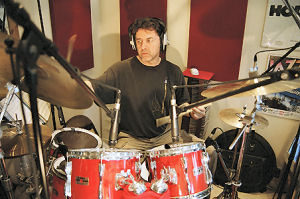
Paul in his studio
You were in America in 1972?
No, my first American trip was when I went on my own, I was just 22. I went to New York, the old New York, when the streets were a more dangerous place, quite different to the one today – that was 1977. I went with a suitcase, not knowing what the hell I was going to do, with ‘x’ amount of dollars, nowhere near enough, I just had no idea, but I had a lot of fun.
I thought I could play, what could I do? I took these tapes with me, quite pathetic really. I’d actually done quite a lot of work by that time, there was an album with Shusha, with Paul Buckmaster, that was an interesting album, I had done Turning Point, Jeff Clyne”s band and Colin Hodkingson’s solo album (Back Door). In fact we’ve just recorded Back Door Too, sadly Ronnie Aspery died about 3 years ago. Apart from Colin’s solo album, I also worked with him and Jan Hammer.
Pete Saberton the wonderful pianist, and Pete Hurt, saxophone player had a band back in the late ‘70’s and I did a couple of gigs with them (depping for Dave Barry). We did this competition (which I think still exists) and we won the Young Jazz Musicians of the Year Award and this was being judged by Henry Lowther and Stan Sultzman. They knew me already because I’d just arrived on the scene and I was doing a band called Turning Point which was Jeff Clyne’s band. It was Henry and Stan that suggested me to Colin. Gary Husband replaced me in Turning Point when I left to go on the American tour with ‘Sniff ‘N’ The Tears’. I’d never worked in the States before and this offer came and I had to do it. Three months in the States? Yes please
Maybe even make some money?
No! Well, there probably was a slim chance, but I still came back with absolutely nothing. What do you do when you’re 24 years old touring the States? Have fun of course. It was the days before AIDS & mortgages! The difference between you and I is, I think, that you were more group orientated than myself, the fact that you joined one, I always wanted to be a session musician.
You were with Nina Simone for many years, what was it like? Most drummers have never played with only a pianist before. Did you have to adapt?
No, I think my love of Zappa and jazz helped. I was very open to playing anything. I don’t necessarily have to play a groove to think I’m doing my job correctly; I can create an audio atmosphere and be happy with that. A lot of drummers have asked if it was difficult working without a bass player, but I’ve always said no, because to me its always down to the material – if the material is good – and one of the things Nina had, apart from being a great pianist was, she had great taste in music. The tunes she would choose were either really good tunes or, sometimes she would choose a tune and I’d think ‘Why this one?’ and then you’d hear her version of it. She would ‘Nina-ise’ things. For example “My Way”, that was a big hit for her, I had never heard her version, but it starts off with bongos, up-tempo. We also did ‘Money, Money, Money’ which is a bit of a joke coming from Nina, all she was interested in was money, but we didn’t do it like Abba of course, we did a “Nina-ised” version. The material always speaks for itself, all you have to do is support what you’re hearing, which hopefully is the big picture, and not just the drum part.
Have you got any thoughts on playing with upright bass players versus electric?
Whatever the material requires, whatever suits, whatever fits. I don’t think I’ve got any concepts on anything! (laughs) I’ve got no sound concept, I’m quite happy to play on any gear at all. Again with Nina, we would just hire gear. Sometimes if you’re in Germany, France or the States, you knew you were going to get the top of the range Yamaha or whatever, but then if you were in Sicily or Sardinia you would get whatever you got and be grateful for it. I like that approach. If you get an old kit that’s a bit knackered the best thing to do is to not start faffing about with it, or you’ll break it, or its going to make some odd noises. The fun part is then making it work.
So that’s another part of it, to make something of not very much?
You have to play to the room; you play to the gig, the people. You can’t just go in with the same attitude one night that you had the previous night. Even if you’re doing three days somewhere, it’s not the same on the Monday as it was on the Sunday, that’s another thing to have to deal with, in jazz anyway and definitely with Nina, that”s probably not so important in pop music or a West End show (laughs).
So that gig went on for 19 years?
Yes, 19 years with Nina. I met her in 1984 at Ronnie Scotts, I got the gig there. Her brother Sam came in on the Saturday night before Nina was due to start, I was playing with the band, he saw me play, she started on the Monday with Martin Drew on drums, after about 3 or 4 days Martin had to go off with Oscar Peterson and they didn’t know who to get and Sam said get that guy I saw last week. So they did. It was an English band who were not that interested in Nina, they were good musicians, but they wanted to play jazz. Nina didn’t want them to do that – she wanted them to play solely for her -supporting her and the song.
It’s a very interesting point, because there is a mind set you have to get into when you’re working with other people, not just in a band, when you respect what they’re doing and the reason why they’re doing it, and if you can’t respect that, perhaps you shouldn’t be doing it.

Paul with producer Trevor Horn
I did a Pet Shop Boys album two years ago, which I really enjoyed, it was at the Mermaid Theatre, BBC Concert Orchestra, with various guests. I was never a Pet Shop Boys fan, because it’s that electro thing, no soul, no blues, not much for me there, but I actually really enjoyed the gig and I respected them much more after doing it. I thought the material they chose was really good, and to me it sounded better with a real rhythm section.
There was something that happened at one time where artists like the Pet Shop Boys were going to America and getting musicians in simply because they couldn’t do stadium rock or theatre rock if there were only two guys and a tape machine.
The Americans wouldn’t accept it so they got musicians involved for the look of the thing – even though there was a bit of miming going on.
I did the Art of Noise back in 1986, that was great, it was a really interesting gig. Musically it wasn’t that deep, but 1986, samplers were new on the scene, it was a fantastic tool for a drummer to have. I came in at the last minute, I almost sight read that gig actually because David Palmer was supposed to be doing it and something happened. I had been doing this bloody awful ferry, going mad, it was on the Baltic Sea, going between Helsinki and Stockholm, this was the worst ever, I really hated it. Basically, I got off this ferry where I was turning into an animal, and within the week I was in Philadelphia, in the sun, drinking coffee. I remember thinking ‘This is better!’. When David Palmer decided he couldn’t do it, they were already at the stage where they had hired Hammersmith Odeon to do the full sound check and they still hadn’t gone through the entire set. Remember, the drums for this were an 8/10 piece Simmons, the sounds changing for every song and also velocity sensitivity on some or all pads for each song. From a drum point of view it was great fun, there was so many interesting noises to trigger, and there were some tuned parts, and we got through the whole set in the 1st day because my reading is not too bad. Because of the sounds being used, you couldn’t improvise very much. All I did was to add real hi-hats and a couple of crash cymbals and I also used a double bass-drum pedal for the Beat-Box rhythms. Dave Bronze was on bass and we were both beating the hell out of this stuff, we were playing rock ‘n’ roll with it and having fun within that beat box vibe. We had Simon Morton on live percussion, he’s been around for years too, so you had this real element in there which added to the groove nicely, and Anne Dudley playing acoustic piano, so yes, I really enjoyed that gig.
Do you often get involved with electronics?
Not these days. I did a lot of programming; I learned a lot of stuff back in the mid ‘80’s when it came out. I was part of a team, and we used to do a whole lot of programming for Top of the Pops, Des O’Connor, Terry Wogan etc for artists such as Mariah Carey, Michael Jackson, Whitney Houston, Celine Dion, Smokey Robinson, I actually played drums with him, that was with Pete Wingfield. I haven’t seen Pete for a couple of years now.
So what tracks have you been involved in?
Well, you’ve got 500 Miles with The Proclaimers, Video Killed the Radio Star by The Buggles. There was one that wasn’t so big, it was a Top 10 hit by a band called Swans Way called Soul Train which was a John Walters production. I did Tracy Ullman, They Don’t Know About Us, produced by Pete Collins, although most people think Charlie Morgan did it, but that”s not true. He might be getting the PPL for it because he did do a version, but I played on the hit and Pete Collins filled a form in wrongly! PPL didn”t exist in those days so I didn”t really care. My first TOTP was back in 1976 with an artist called Jesse Green and the track was called Flip.
But do you get what you’re supposed to be getting, financially speaking?
I’ve no idea. In the early days when PAMRA / PPL started, we all had those forms, I filled out a whole list of tracks, I started my recording career around 1973, when I look at the website at how many songs I’m accredited for there’s only about 20, so all that form filling was in vain obviously, but you only get paid on tracks that get airplay anyway, and of course most things you play on are not hits. I do okay though, Buggles, Proclaimers, Van Morrison all get quite a lot of airplay.
What are you depping at the moment?
In the West End, I dep in the Lion King and Chicago. But I just got a call yesterday from James Powell (Georgie Fame’s son) who is also a drummer, so I’m going to do Joseph now as well.
So Georgie Fame’s son is playing it at the moment?
Yes James, he’s the drummer
Do you sit behind the guy you’re depping for or don’t you bother with that anymore?
I do bother with that, you have to, but James will send me the music and a video too.
Do you sit in the audience to check out the show?
No, the way I’ll learn it is to look at the music, and listen to a CD or whatever they have sent to me, and watch a video of the conductor if there is one, so I’ll get that well and truly under my belt and then I’ll go to at least two shows, sit behind the drummer and watch.
So is that all necessary?
Yes, you’ve really got to learn it because there’s so many possibilities of things going wrong, if the conductor changes something, if something happens on stage and he has to move things quickly, you have to be more focused on him than what’s happening on the manuscript, although that too is obviously important.
I think my lack of music/drumming education and not following certain rules has worked out pretty well for me, I don’t try to do what anybody else does.
It’s long overdue but I’ve always wanted to write a piece on ‘How do you play a West End show’. That said, what is it like depping Chicago?
Well, that’s quite a hard one because it’s like an old Vaudeville thing. I’m responsible for gun shots, on a snare of course, and there’s choke cymbals, wood blocks, choreographic things going on. I’ve met a couple of good drummers who won’t touch it because it is quite difficult especially if you are not used to doing shows. There’s a bit of tuned, nothing too difficult, a few noises as well, ratchet, pop gun etc, there’s a lot going on for the drummer. I enjoy it because I like the music, I like the arrangements by Ralph Burns, good tunes too. I’m not actually into musicals but if I had written a musical, I wish it had been that one, or West Side Story! (laughs)
Do you collect drums or are you not bothered?
Not bothered, no room. I’ve got 3 drum kits, an old Yamaha 9000 drum kit, a red one, which is in the Drummer Online studio, I’ve got a little Manu Katche kit which I use to go and do my jazz gigs, I’ve also got a white Yamaha 9000 and I sort of use bits and pieces of both. I’m doing a blues rock gig on Friday, so I will use the 22″ bass drum for the volume, the Manu bass will be too small.
When you get to the West End gig, is the drum kit there?
It’s always there, its all mic’d up. That’s the other thing. The choreography that you have to be able to do, because you can’t start messing around with these kits, you’ve just got to be able to play it, whatever it is, you might be able to adjust the cymbals a little bit, but basically it’s best if you can, just go in and play it as it is.
Do you grip your sticks both ways?
No I’m old fashioned, I play traditional.
Have you never played matched grip?
No
Never felt the need?
I’ve felt the need for many things – more money, more technique, more everything, but I seem to get by with what I have.
I played traditional grip like you all my life and I switch to matched to go around the toms which is absolute nonsense, but that’s what I do.
Back in the early ‘70’s people like Lenny White and Billy Cobham, they came out playing that way, leading with the left hand, I”m sure it makes some things easier, but if you close your eyes, what’s the difference? It’s a bit like Trilok Gurtu, the jazz fusion drummer, you see him sit down, which looks good, but if you just listen, the fact he’s sitting on the floor makes no difference to me.
I am in awe of what he does
He’s special, very special!
When he goes into his ethnic cultural stuff, it’s just mind-blowing
Its all totally valid, but why would you want to do something just to emulate what another drummer is doing? If you do what you do, and in my case being self taught, I think my lack of music/drumming education and not following certain rules has worked out pretty well for me, I don’t try to do what anybody else does. I’m sure I do, because you can’t help but be influenced, but I would prefer to do a clichéd simple rock fill than do a clichéd Dave Weckl/Steve Gadd fill because I think the latter is more clichéd in an odd sort of way, probably because of all the drum schools that are around these days.
And of course the one thing you’ve never seen in life is drum soloist wanted… there’s never been a producer who’s said ‘can you make that a bit more complicated?’ If anything they want it to be a bit more arsehole.
I know what you mean by that. I remember doing one of my first sessions, back in 1975, I think it was Billy Ocean’s first album. It was Ben Findon producing and I remember Paul Westwood was on bass, Les Thatcher on guitar, can’t remember who else was there. All he [Ben, the producer] would allow me was bass drum, snare drum, hi-hat and a couple of crash cymbals and he said he just wanted snare drum fills on beat 4. At that time, I was only 20 and pretty inexperienced in the studio, so I found it quite hard not adding that extra semi-quaver, no toms to hit either, but I did manage to do it of course. More studio discipline learned that day and incidentally, it was an album done in one day!
Tell me about your online thing?
Well that’s something that came about because of all the obvious reasons really. Number one, there were very few sessions to be had, unless you’re one of the privileged three or four, we all know who two of them are!

Paul with Alan White from Yes
Give me the names
No
You’ve got Ralph (Salmins), who else?
Ian (Thomas), and maybe there’s a couple of others, but its mainly Ralph and Ian. I mean, I know them both, I would say we are friends, but you do tend to think ‘Are these the only two drummers in the whole bloody world?’ It”s that coffee talking! (Laughs)
Professional jealousy aside for the moment, let’s drag you back to how you’re making your money, because of obvious reasons, the sessions have dried up, so you do, what?
I decided I would try to do some sessions from home, so I got my friend and engineer Niall Acott from the Angel Islington Studios to come and mic me up, bought another drum kit and set it up in the garage, and did some advertising. I picked up some work. The sound I went for was the bog standard studio noise – Yamaha kit with pinstripes. I know I’m not going to get a call from Trevor Horn to do a major pop session from there, so I wanted a “one size fits all” sound. I wanted something that would cover film sessions, TV jingles, and tracks for people writing songs at home. I’m currently doing a project through e-session.com where the bass player happens to be Chuck Rainey. I also did a couple of tracks for the new Back Door Too album from home.
Gig wise, I’m doing The Istanbul Jazz Festival in a few weeks time which is a tribute to Nina, so that’s a fun thing with the old Nina band and Dee Dee Bridgewater, Tracy Chapman and a few other artists singing the songs that Nina made famous. I also work with Mick Hutton, bass player, that’s very enjoyable because apart from working with Mick I get to work with some other really good players in that band – Mark Edwards, keyboard player, Andy Panyai, saxophone player, Barry Green, keyboards, and there”s a couple of Back Door Too gigs coming up.
Technically, you record in your garage, they send you an MP3 to get started, is that just to listen to the tune?
That’s just to listen to the tune, I ask them to send a stereo mix of the track. I don’t want the drums and I don’t need a click track, I create my own, if there are odd time signatures in it and if there are tempo changes then send me the tempo map, and I’ll paste it all in.
You’re pasting it into what?
Logic 8. I’ll then record some drums, email it back to them as an MP3, they can then put their suggestions forward, I then re-do the track taking their suggestions on board and that’s about as far as it goes. I don’t really want to do anymore than 2 re-takes if possible, although I will of course. That may sound arrogant, but I do know what I’m doing and I’m normally dealing with pros and then you don”t have a problem. I’ve dealt with a couple of non-pros and they were by far the most difficult. As always, when you’re dealing with people who don’t know, they just don”t know and it”s always difficult.
So you get on with it and do what you think works. How do you sync it?
You don’t have to worry about that. You’ve loaded your MP3 in (or whatever), you know it’s at 120bpm (or whatever) and you play. All you’re sending is audio files, they position those files at bar 1, and that”s it.
So when you said no click, if there’s no click how do you do it?
No, they don’t have to send me a click, I generate my own within Logic 8, they just have to tell me the tempo. So long as I know what the tempo is, no problem. They will always have for example a two bar count in. I clean up the files beginning and end and optimise the audio files. You’ve got two bars, which is the count in as it were, so all they’ve got to do is put all the files at bar one and that’s it. Or if their song starts at bar 10 move all the files to bar 8.
Is there a union rate for this?
No, I usually charge about £125 – £150 for a 3 minute track, I’m comfortable with that for a couple of takes. It still probably takes about 3 hours because you are doing the processing too.
If it’s coming from abroad, I have to put a bit more on because then I’ve got to use PayPal and they take a small percentage. BACS (Bank Automated Clearing System) or cheque in the post is also acceptable (Laughs).
For the e-session.com project, he’s paid me half up front in dollars, and I will receive the other half on completion. I screwed up on that, the first time I had this offer come through, I underpriced myself totally. I got $3,000 when actually it should have been about $6,000 because there are 19 tracks!! That would have been okay if the tracks were well formed, but they weren’t, so being a perfectionist, and because Drummer Online is new, I didn”t want anything going out half-cocked, so I spent a lot more time on those tracks than I should have done.
How much time do you spend, I assume your not recording in ‘real time’ by any means. Are you going to spend a morning doing one track?
Probably three hours. It’s not the playing that take the time, it’s the processing. I make sure that when the people get these files there’s no misunderstanding of what they are, each one says kick, snare, hihat, whatever and there are 11 drum files, and that”s not including any percussion. Plus there could be 2 or 3 takes of the same track.
This is all audio. If they wanted electronic drums for midi files I’ve got some Octapads with a bass drum pedal and a hi hat pedal, but what I’m selling is the real organic thing. Everything is real, that’s the whole point, most people can program, even a bad drummer can play electronic drums, or even real drums and make it sound good. So the whole purpose of my website and me doing this thing is, people get a real drummer, who can actually play, is very experienced and they get a good quality sound, courtesy of a great engineer (Niall Acott) and checked at The Angel Studio in London, which is obviously all singing, all dancing, so if there were any problems within the sound you would certainly hear them there. It is a middle of the road studio sound (for the time being). I lost one job because they were a group, and they asked if I could get that Ringo sound and I said it depended on which Ringo sound they’re talking about. They were thinking Ludwig drum kit in a large live room, like Abbey Road. I can’t get that because I’m in a small drum booth with a Yamaha kit, if you want to process it you can, but it’s still not going to sound like an “open” sounding kit in a big room. The sound is the sound, and that is why I have taken the time to put so many examples on my web site, that way potential clients have as clear an idea as to the sound they will receive.
That’s the other thing about it, you haven’t got the same compressors, the same microphones, you’ve probably got far more microphones than Ringo had in Abbey Road and all those unsophisticated things along with the Pye limiters are what made his sound.
Compression, I don’t deal with. Niall comes over; he knows what he’s doing. It’s a raw, flat sound that can then be treated accordingly. Once again, when you’re dealing with people who don’t know, they just don’t understand. On my Show-Reels, it”s pretty obvious (to a pro) which tracks have been worked on by a professional engineer, and which ones are mixed by the amateur at home. I put them all in there though because I think it”s honest, and I am happy to be employed by anybody! (Laughs)
This is really good. How many do you do a week?
It depends. I haven’t done one now for 3 weeks, but 3 weeks ago I got 2 new clients in one week.
And this is from the website or advertising?
From both I assume. I don’t know what comes in from the website and what comes in from advertising. I advertise in Sound-On-Sound, but I just did a film, a Nick Park film, Tales of the River Bank for Mark Thomas composer. Mark knows me, he enjoys my playing so he trusts me and he sent me about 50 cues. This is another thing, you’ve got to be organised, I’ve got to methodically keep everything in order so I don’t confuse myself, and when I send them to him he doesn’t get confused either. Audio housework.
Because there’s a huge possibility to get it wrong?
Absolutely. Again a guy I didn’t know sent me this track, which he said it reminded him of Carmel [the town] out on the West Coast. It was an easy listening, light Latin/LA pop funk thing, so I did it, light percussion, shaker congas etc. I don’t count myself as a percussion player but I can play percussion as well as most drummers and I can give the flavour. For that I don’t charge full rates, I’ll add an extra £25 or £30, just because I think it finishes off the product, it gives them an option too, if you want a real Cuban feel, get someone else, but I can cover most pop requirements.
Drummer Online is the important thing. I don’t know where my future lies, but it’s a way I can see of giving people some well played, well recorded drums, that will not break the bank.
You don’t need an engineer for this, do you?
No,because its all been set up already by Niall. I just have to play.
And it’s Mac based?
Yes, Mac G4, MOTU hard disc recording system, Logic 8
Have you had to do anything further with Broadband?
The only time broadband comes into it, is when I’m uploading it to my FTP [File Transfer Protocol] site.
You don’t send it back that way?
No, I send it to them to listen to in MP3 format because it’s small and will fit in to an email. Broadband does still help here of course.
How do they get it as a whole thing?
I can either upload the finished files as AIFFS or WAVs or whatever, to their FTP site or, I upload it to my FTP site and give them the user name and password.
There’s one perfect example, it’s the first track on the 2007 show reel. It’s a jingle company, they rang me about 2 o’clock in the afternoon and said can you do this now? I said yes, and they sent me this brief. I put the drums down, sent it back to them, they did the same thing with a guitarist, the guitarist sent his track back, so at 5pm they had a completed track at their office with real drums and a real guitarist, both recorded from home, by 6pm they actually got the contract too. Everybody was happy, and that’s one of the ways I see this working.
About three weeks ago I had two sessions, one was for Guy Farley and that came through Paul Clarvis, he’d asked for Paul, Paul couldn’t do it, and Paul said ring Paul Robinson, he’s the Drummer Online guy. I happened to be at home and so could do it, he asked if I could complete it by 4pm and I said yes. That’s another example of how it works, under time constraints, if a guy wants to come into town and record drums, its going to cost him about £400 for the studio and it’s a day out of his (or her) life, by using Drummer Online the sound’s done & its only going to cost them about £150’ish. What a great deal! (Laughs)
What’s the name of the website again Paul?


